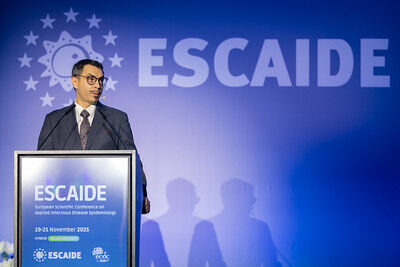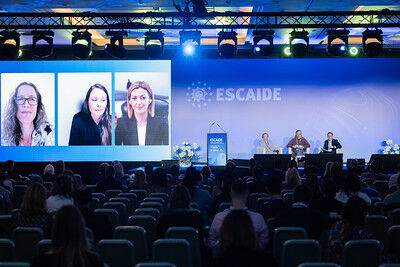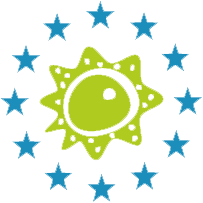ESCAIDE 2025 - A summary of day 1
The opening day of ESCAIDE featured sessions on public health governance, artificial intelligence, global epidemic intelligence, and science-based leadership.

The 2025 ESCAIDE was formally opened by Pamela Rendi-Wagner, Director of the European Centre for Disease Prevention and Control, Konrad Korbiński, Director General of the Ministry of Health of Poland, and Piotr Kramarz, ECDC Chief Scientist and Chair of the ESCAIDE Scientific Committee
In her opening remarks, ECDC Director Pamela Rendi-Wagner emphasised the importance of being prepared. "To be ready and prepared for future health threats, cooperation and coordination at all levels and across sectors is key."
She went on to stress the need for evidence in interventions:
“We see how mis- and disinformation is spreading faster than any virus. Trust in public institutions is weakening. We need to ensure public health interventions remain evidence-based.” - Pamela Rendi Wagner, ECDC Director
Piotr Kramarz welcomed everyone to ESCAIDE 2025 and stated that “I am Polish, so having the Conference in Warsaw means a dream come true. Witam szczególnie gorąco wszystkich uczestników z Polski!" He thanked Warsaw and Poland for hosting the conference andsent a special thank you to the Scientific Committee and the reviewers.

Konrad Korbiński, Director General of the Ministry of Health of Poland underlined the need for effective communication and the need to fight misinformation: "ESCAIDE has always been about science, but today - more than ever – it must go beyond its traditional limits. It must also be about how we communicate knowledge effectively to society, how we use evidence to change behaviors and counter misinformation."
In the first plenary session titled ‘High stakes, low certainty: post-normal science in public health governance’ chaired by Agnes Hajdu and Henriette de Valk, speaker and co-creator of the concept, Silvio Funtowicz, disentangled the complexities of public health governance in situations with high stakes and low certainty. Presenting testimonies from various scientific personalities, Funtowicz challenged the audience to reflect on the meaning of science and expertise in this 'post-normal' world, and their roles and limits in public health decision-making.
“Citizen science challenges expert monopoly over knowledge. What began as activist inquiry evolved into institutionalised participation with tensions over empowerment and control” - Silvio Funtowicz, Researcher at the University of Norway, speaking at Plenary A
The first thematic session of day 1, ‘Artificial intelligence in public health: hype or help?’ saw a discussion on how artificial intelligence is being applied to strengthen public health surveillance, outbreak detection, and risk assessment through three expert-led use cases. The first case featured the EIOS platform, which uses an ensemble of multiple large language models (LLMs) to extract epidemiological information from reports and convert unstructured data into a structured, machine-readable format. The second case, BEACON, is a real-time outbreak reporting system which detects emerging threats and standardises reporting. The third case, MOOVEing AI, is an open online evaluation platform designed to co-develop AI models collaboratively. It promotes open-source innovation, dynamic updates, and representative evaluation.
The discussion emphasised trust, transparency, and high-quality data as essential. The key message: AI offers great potential for outbreak detection and public health surveillance, but success depends on trust, transparency, expert involvement, and global cooperation.
“Empower yourself, create evidence yourself and make sure they are accepted and aligned with experts. Don’t fall behind and make sure you have evidence in the way” - Annie Hartley, Professor at the Federal Polytechnic School of Lausanne, speaking at the Thematic Session 1
The second thematic session, ‘Global Epidemic Intelligence: strengthening early detection and assessments of public health events’ explored how Epidemic Intelligence teams operate and the tools they use to detect, validate, and communicate early signals of public health threats. Three speakers from different regions—Europe, Africa, and Canada—shared their experiences and approaches.
All speakers highlighted the critical role of tools and systems in supporting event reporting, providing technical guidance, and conducting risk assessments. Platforms such as EIOS, ProMED, HealthMap, GPHIN, and event management systems are widely used to collect and analyse signals.
A recurring theme was the importance of a strong international networks to validate signals and share information quickly. Speakers emphasized that “no one is safe until everyone is safe,” underscoring the interconnected nature of global health security. The key takeaway message was clear: Epidemic Intelligence relies on collaboration at both national and international levels. Building resilient networks and fostering partnerships are essential to strengthen early warning systems and protect global health.

In the last plenary of the day ‘Science-based leadership in public health: decisions under pressure’, Eirini Agapidaki highlighted how the Greek Ministry of Health has been navigating uncertainties in times of crisis and has had to make decisions promptly. Science-based leadership is trusting data, navigating uncertainty and relying on institutions.
The need during the COVID-19 pandemic to bridge the science gaps, manage information overload and the need to have real-time data was stressed by Karin Nygård. She introduced the concept of knowledge preparedness, which was recently included in the Norwegian preparedness plan to make sure that there are mechanisms in place to be able to rapidly generate evidence and knowledge in times of crisis.
Tanja Kuchenmüller explained EVIPNet, the ‘Evidence-informed Policy Network’ which was created to support and promote evidence.
“In crisis situations, when evidence is incomplete, one should not wait for certainty but act on the best available evidence” - Tanja Kuchenmüller, Head of Unit for Policy at the World Health Organization, speaking at Plenary B
Finally Alemka Markotić highlighted the gaps and barriers Croatia had to overcome during the response to the Covid-19 pandemic. She decribed the lack of diagnostics, therapeutics, personal protective equipment, healthcare workers, beds and ventilators. Bravery, transparency, rapid decision and trust were key. “What would the population eat if we put the whole country in lockdown?”, she asked, and stressed the need to “balance epidemiology, economy and trust”.

